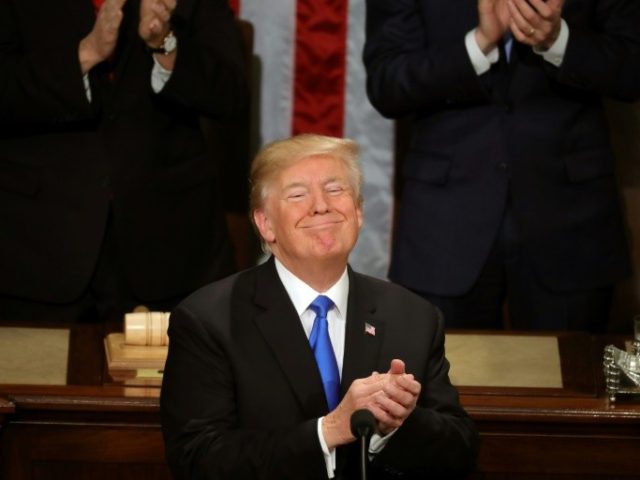WASHINGTON, DC — U.S. President Donald Trump failed to broach any subject using the terms “radical Islamic terrorism,” “jihadist,” or any of their variations during his first State of the Union address (SOTU), refusing to use phrases some of his advisers have tried to discourage the commander-in-chief from using in the past.
During his campaign rallies and at the beginning of his administration, Trump was known to blast his predecessor Barack Obama and members of his administration for refusing to use the terms in an attempt to appease the Islamic world.
President Trump did mention “terrorism” and similar words at least nine times during the State of the Union, mostly in the context of immigration.
Referring to his plan to reform to broken U.S. immigration system, he said, “Our plan closes the terrible loopholes exploited by criminals and terrorists to enter our country, and it finally ends the horrible and dangerous practice of catch and release.”
Trump added:
In recent weeks, two terrorist attacks in New York were made possible by the visa lottery and chain migration. In the age of terrorism, these programs present risks we can just no longer afford.
…
Terrorists who do things like place bombs in civilian hospitals are evil. When possible, we have no choice but to annihilate them. When necessary, we must be able to detain and question them. But we must be clear: Terrorists are not merely criminals. They are unlawful enemy combatants. And when captured overseas, they should be treated like the terrorists they are.
Even when alluding to the murderous Islamic State (ISIS/ISIL) and al-Qaeda jihadist groups, Trump did not call them “radical Islamic terrorists,” only saying:
In the past, we have foolishly released hundreds and hundreds of dangerous terrorists, only to meet them again on the battlefield — including the ISIS leader, al-Baghdadi, who we captured, who we had, who we released.
So today, I’m keeping another promise. I just signed, prior to walking in, an order directing Secretary Mattis, who is doing a great job, thank you to reexamine our military detention policy and to keep open the detention facilities in Guantánamo Bay.
I am asking Congress to ensure that, in the fight against ISIS and al Qaeda, we continue to have all necessary power to detain terrorists, wherever we chase them down, wherever we find them. And in many cases, for them, it will now be Guantánamo Bay.
White House officials like National Security Advisor H.R. McMaster have reportedly dissuaded the use of the terms, and Trump did not use it in his speech to mark the 16th anniversary of the 9/11 attacks last week.
“McMaster also urged his staff to stay away from the term ‘radical Islamic terrorist’ because it’s a loaded term that can offend allies and partners in the Muslim world,” reported National Public Radio (NPR) in April 2017.
Under possible pressure from conservative critics and his way of walking to the beat of his own drum, Trump used the phrases soon after he failed to do so during the most recent 9/11 attacks commemoration, telling the United Nations last September that the U.S. would “stop radical Islamic terrorism.”
On Tuesday, the president also failed to mention a new Saudi Arabia-based anti-terror center or the U.S. relationship with the Sunni kingdom he touted last year, namely efforts to combat Shiite Iran’s growing influence he praised last year.
During his Riyadh-based speech to the Muslim world in May 2017, President Trump declared:
There is still much work to do. That means honestly confronting the crisis of Islamist extremism and the Islamist terror groups it inspires. And it means standing together against the murder of innocent Muslims, the oppression of women, the persecution of Jews, and the slaughter of Christians.
He did not once mention Saudi Arabia during SOTU, but did allude to its regional nemesis Iran at least three times.
“When the people of Iran rose up against the crimes of their corrupt dictatorship, I did not stay silent. America stands with the people of Iran in their courageous struggle for freedom,” said the president, alluding the recent protests against the oppressive Islamic regime.
“I am asking Congress to address the fundamental flaws in the terrible Iran nuclear deal,” he continued.
In May 2017, Trump touched a glowing orb with Saudi King Salman and Egyptian President Abdel Fattah El-Sisi of Egypt as they inaugurated the Global Center for Combating Extremist Ideology in Riyadh.
“Around the world, we face rogue regimes, terrorist groups, and rivals like China and Russia that challenge our interests, our economy, and our values,” declared Trump during his speech on Tuesday. “In confronting these horrible dangers, we know that weakness is the surest path to conflict, and unmatched power is the surest means to our true and great defense.”

COMMENTS
Please let us know if you're having issues with commenting.